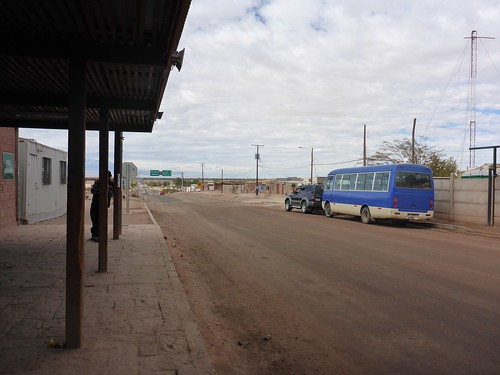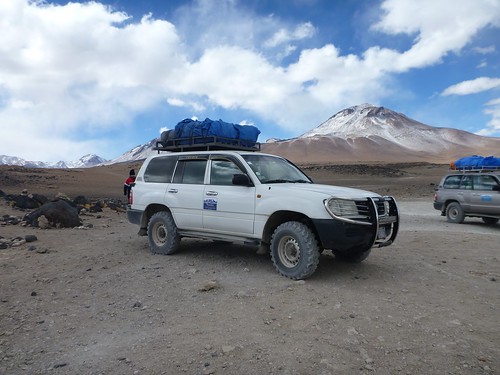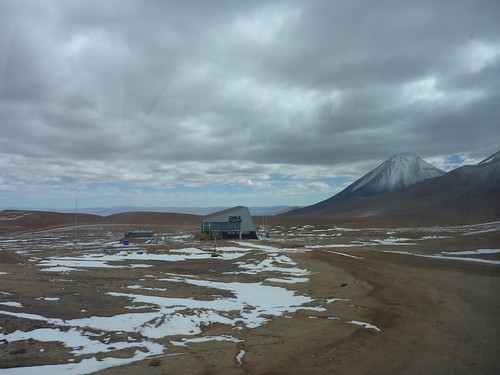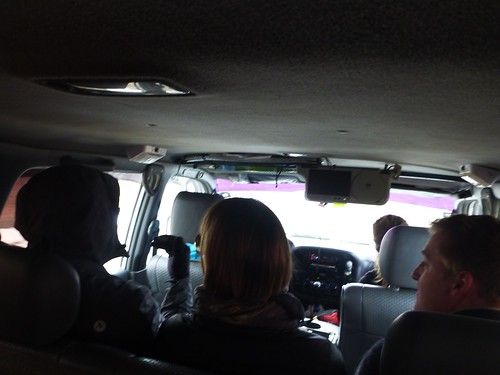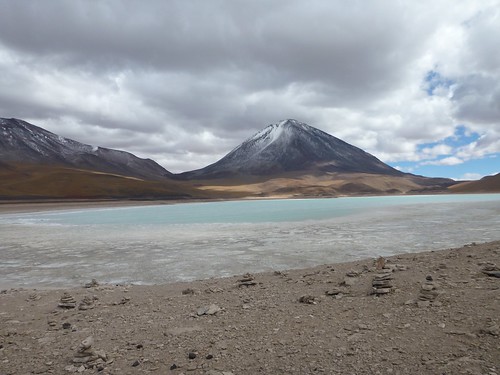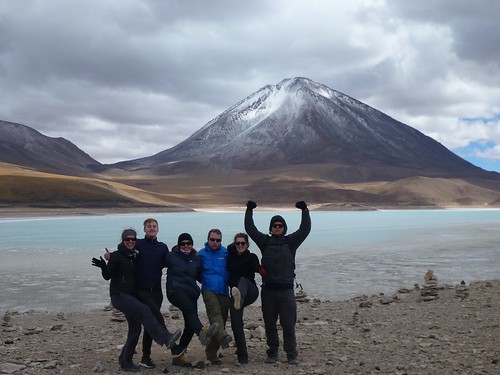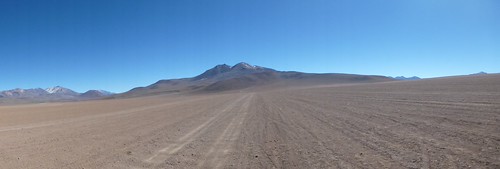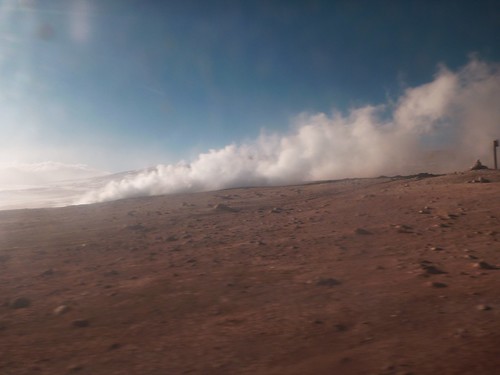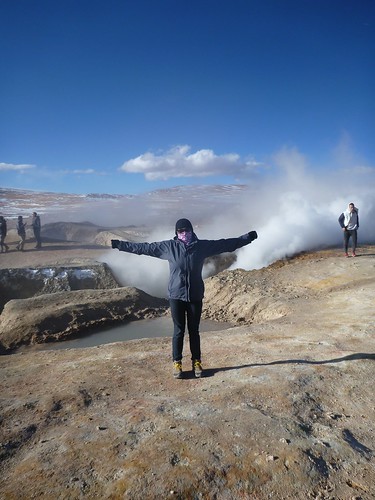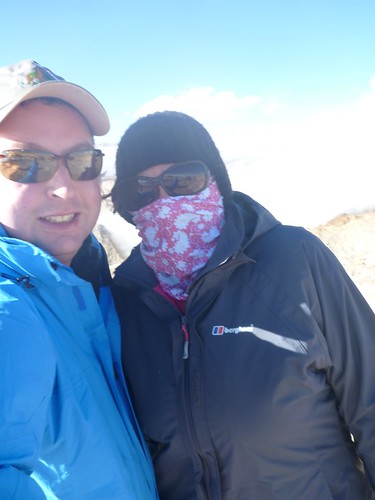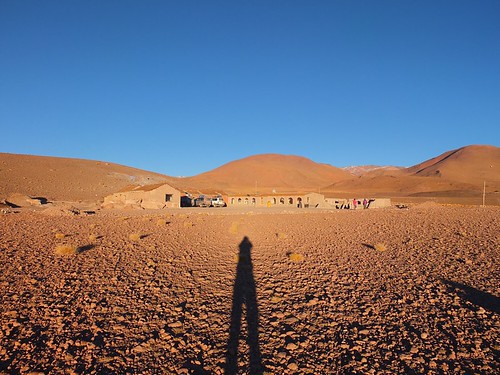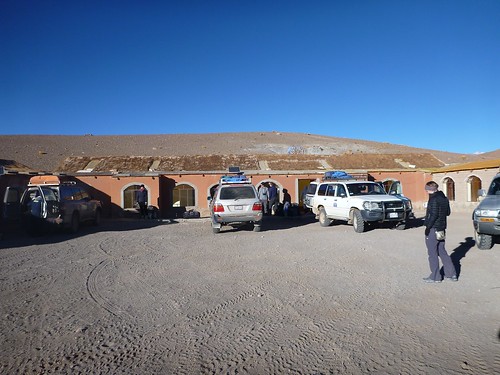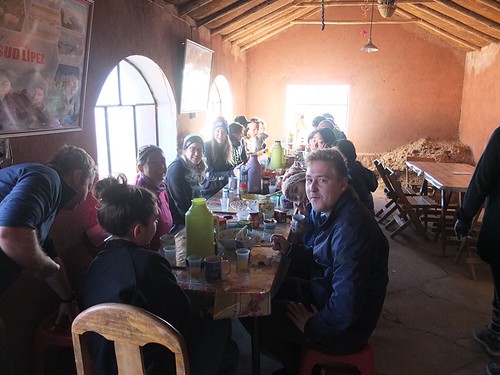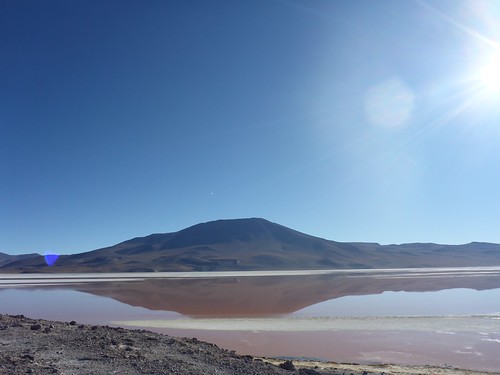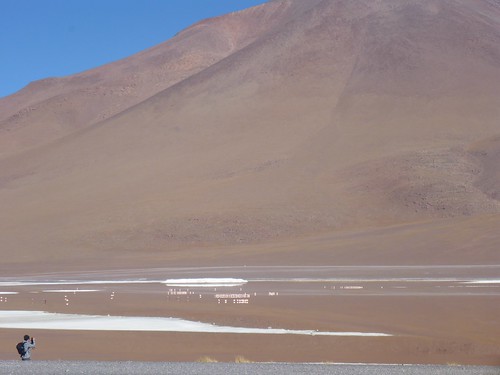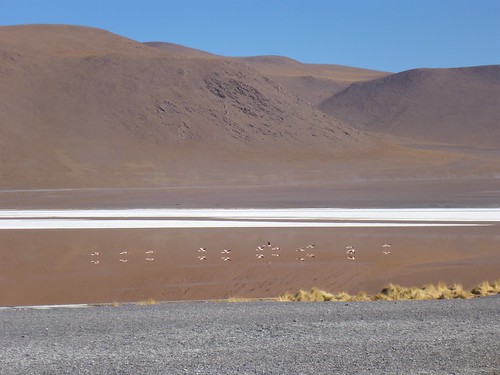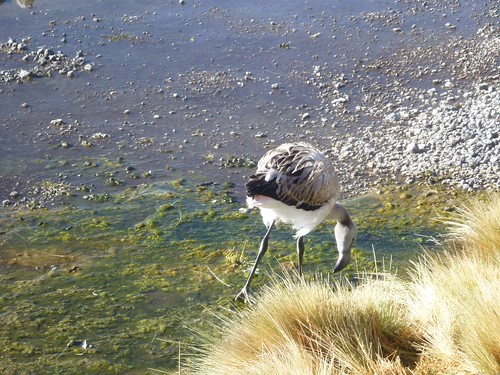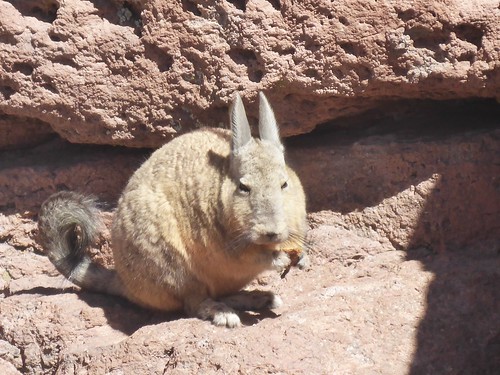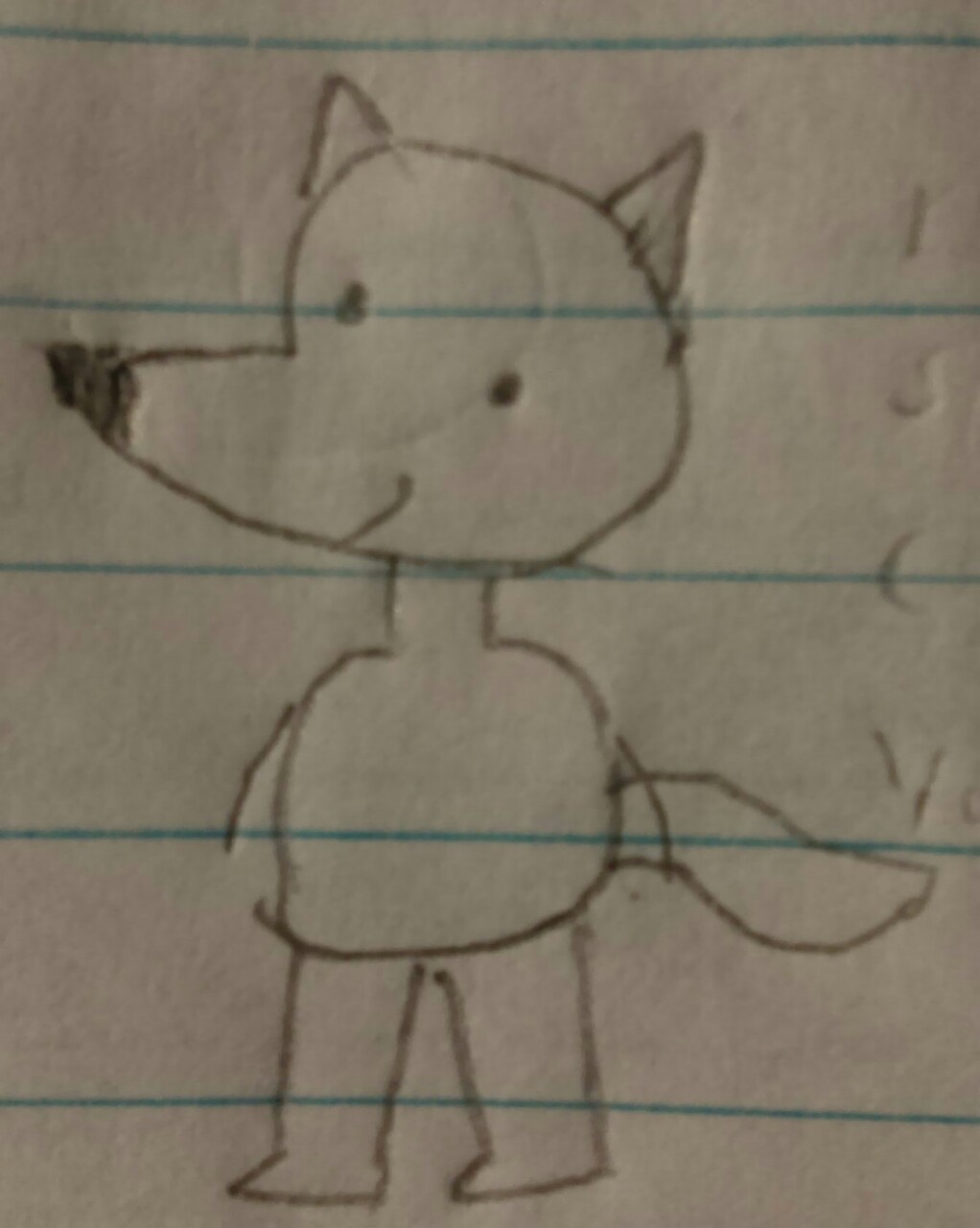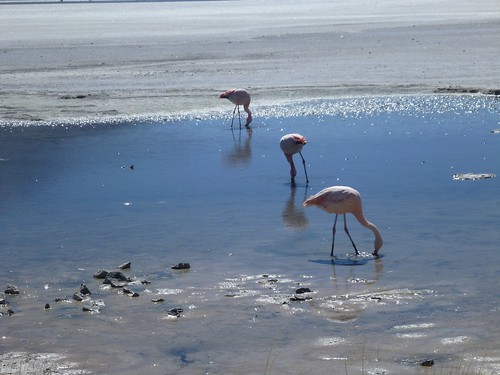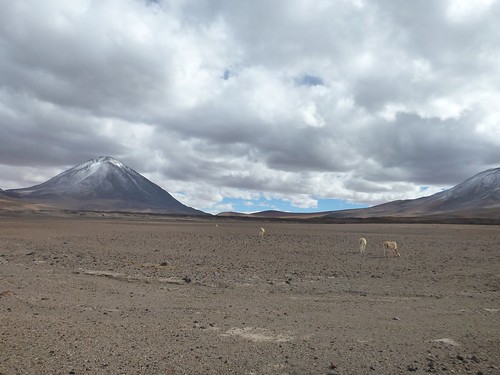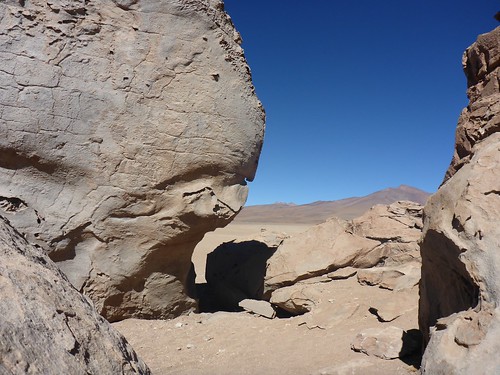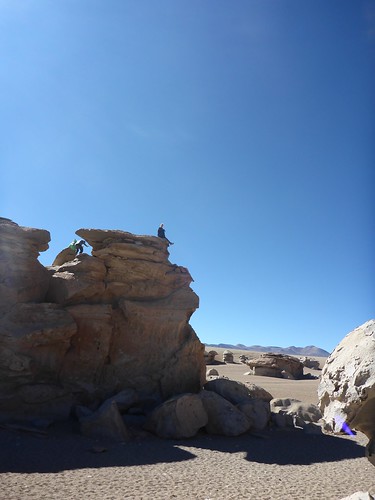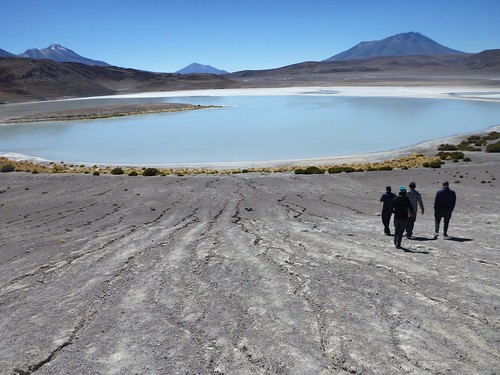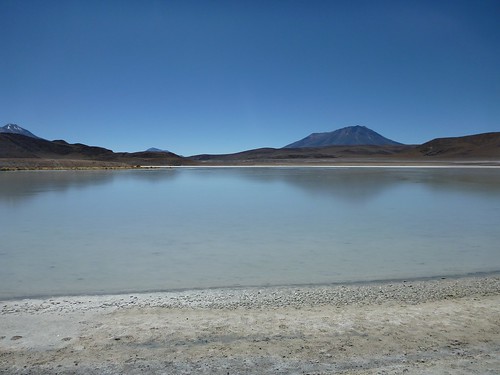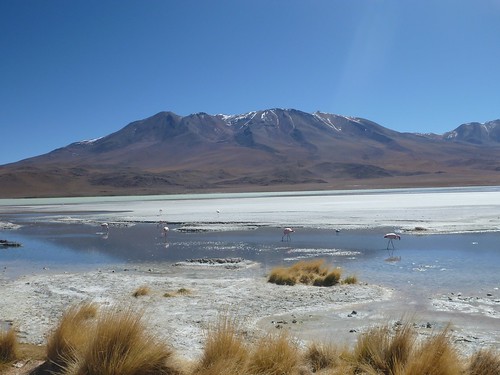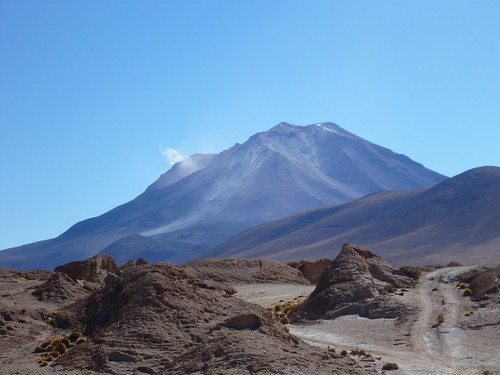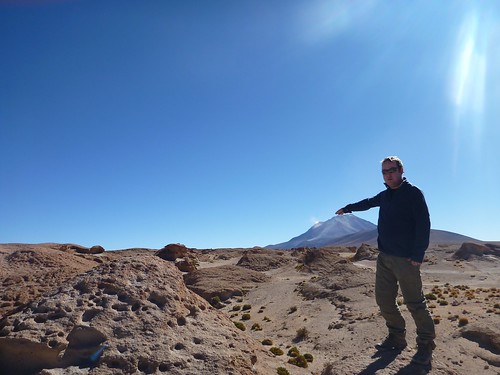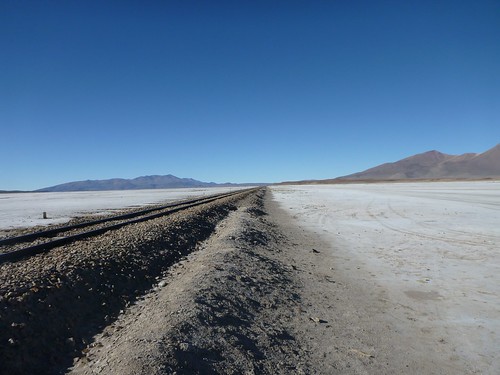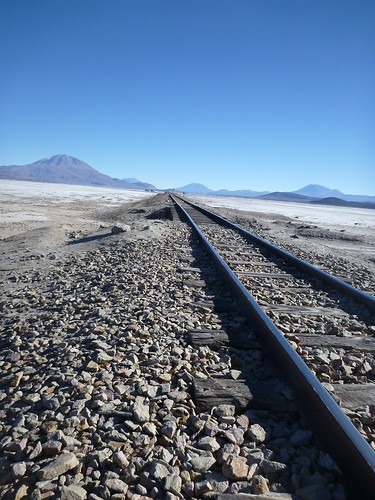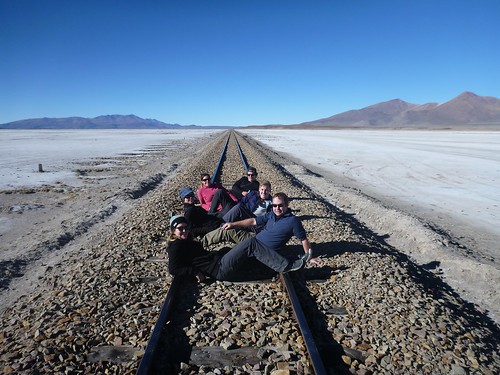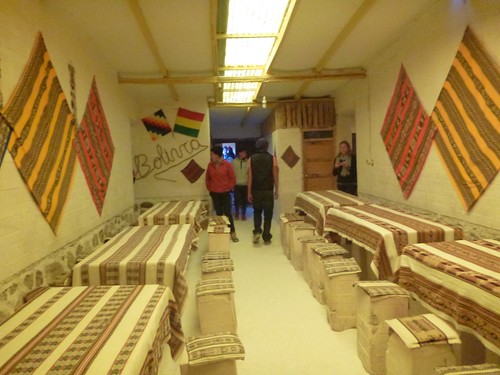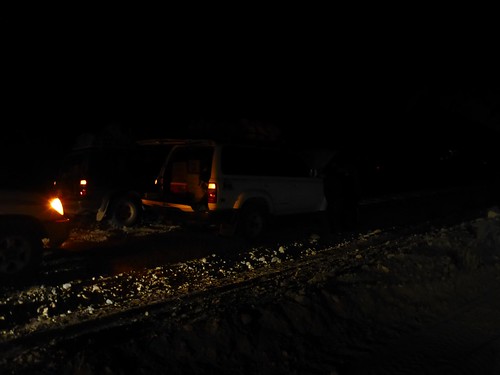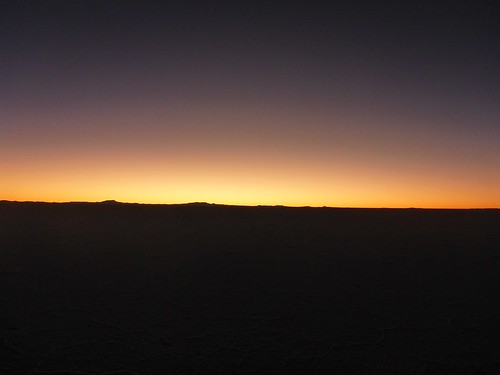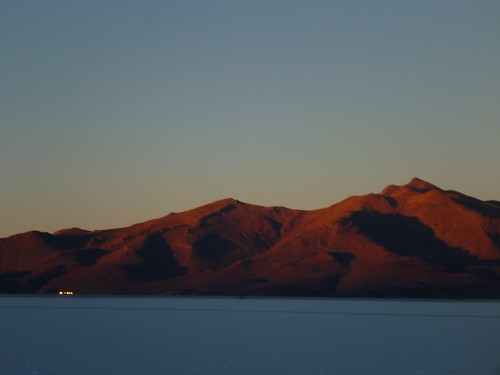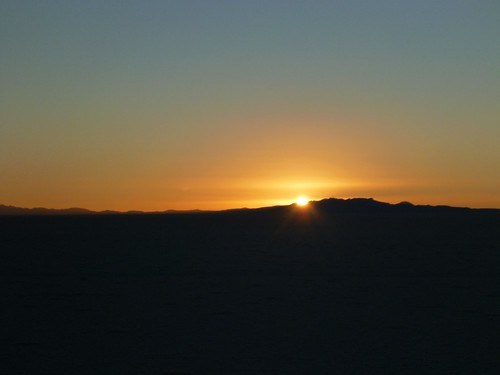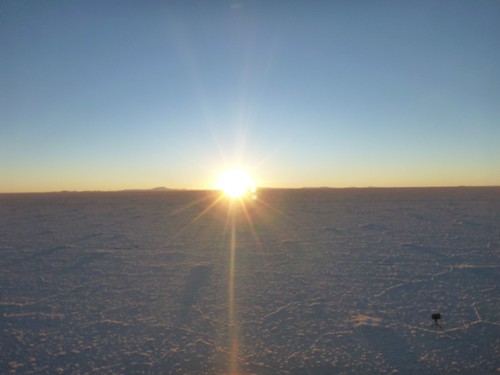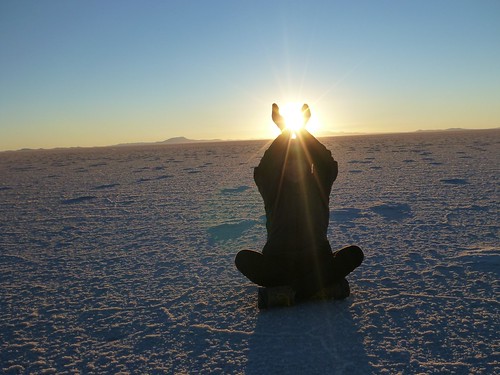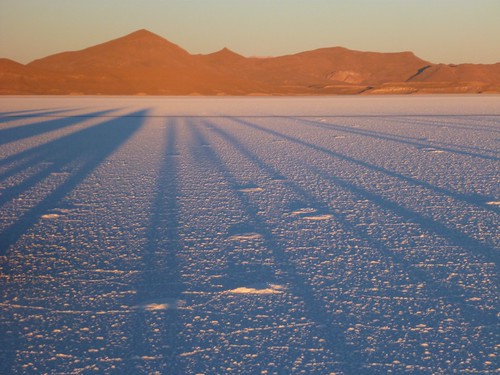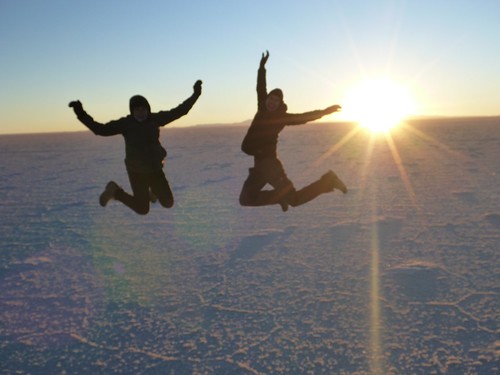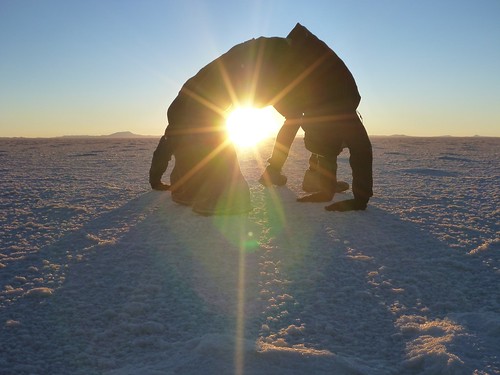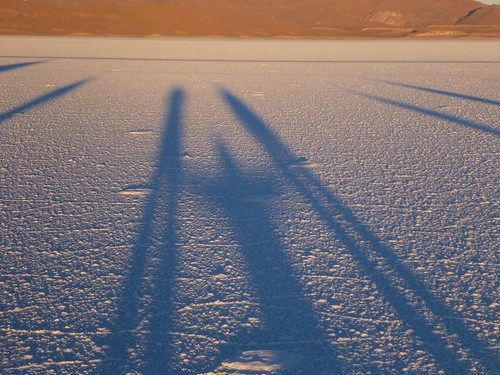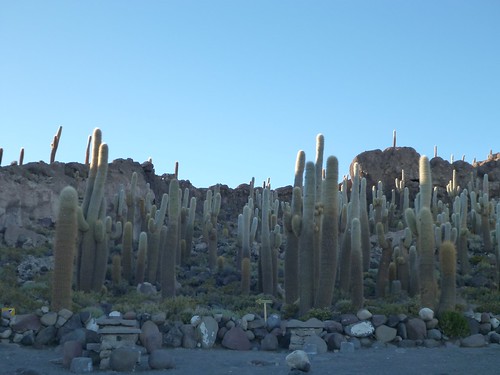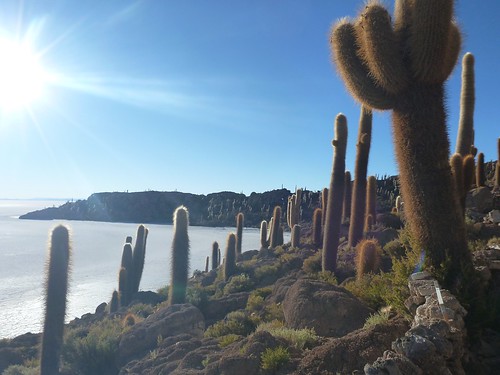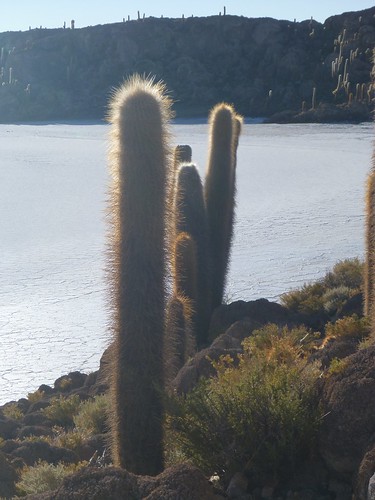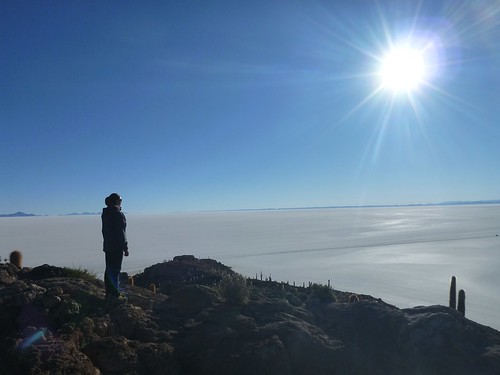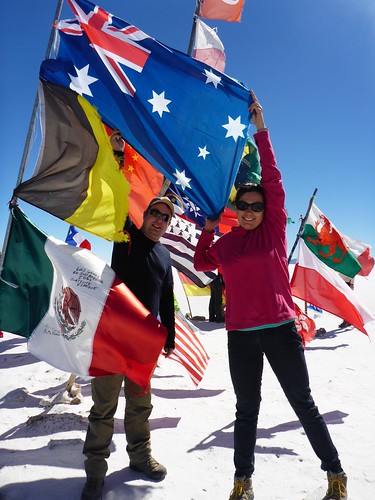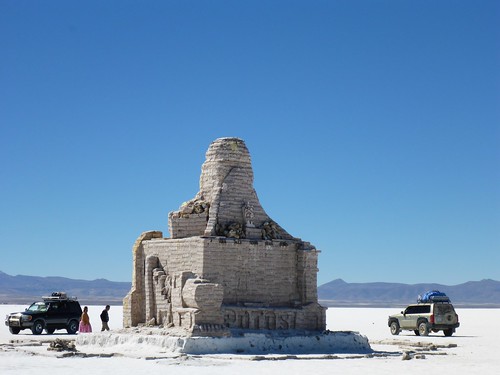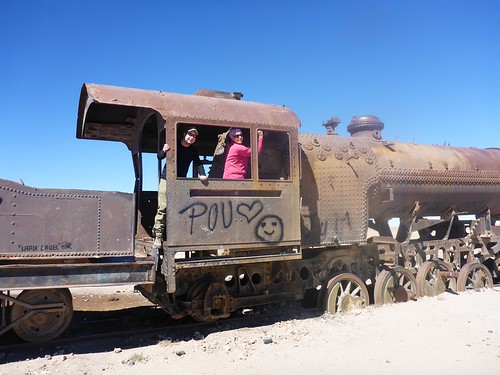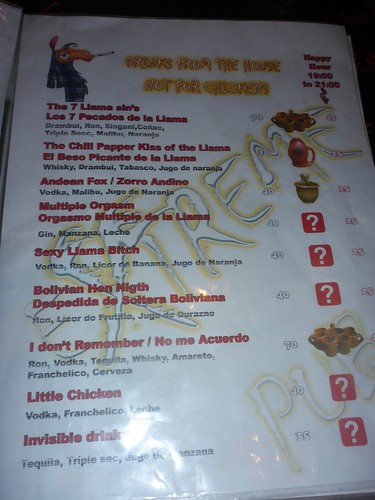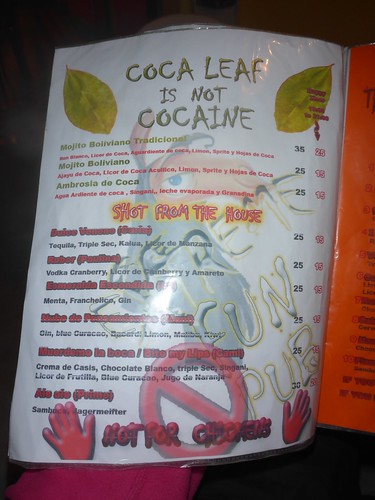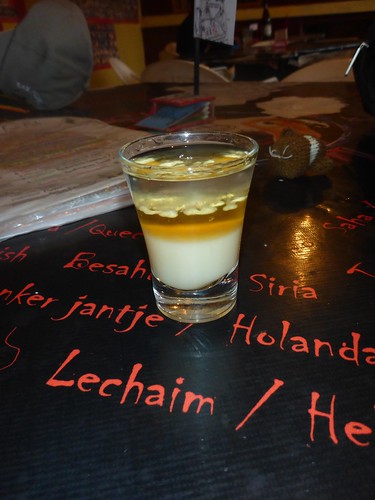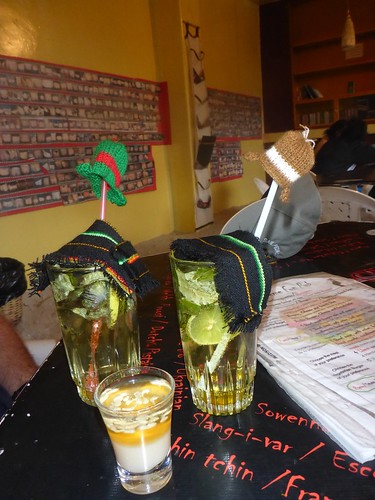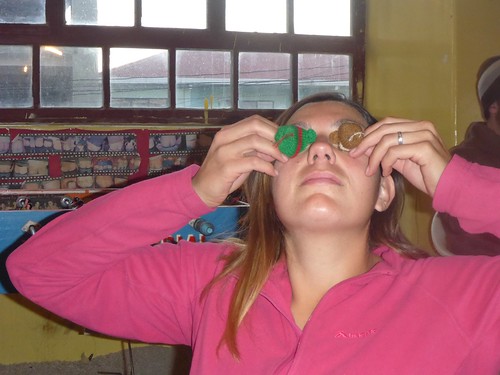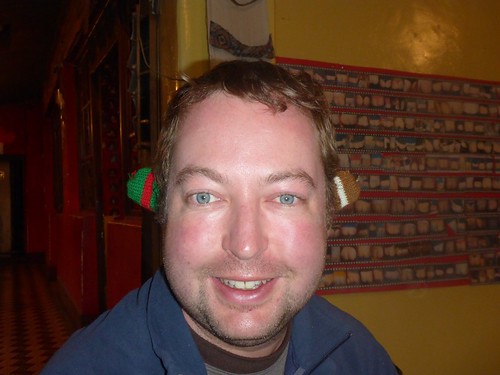Goodbye Chile and hello Bolivia! Welcome to border crossings, 5000m altitude, geysers, snow, desert and salt flats.
Awake and raring to go on another adventure we sat outside in the hostel courtyard on Wednesday morning, waiting for the bus to take us on the next part of our trip. Danielle, Paul, Dennis, Holly and the two of us were more than prepared, carrying at least 42 litres of water between us, a couple of kilograms worth of snacks and more warm clothes than you could poke a stick at. Our bus came to collect us from the hostel and we were taken a few kilometres down the road to go across the Bolivian border, and then climb into our Landcruiser to get going across the Atacama. The adventure was on!
Until we stopped… Apparently there was a “problem” with some “snow” at the border. By problem they meant arguments between some immigration officials, and by snow they meant the border had been sealed.
We sat around for a few hours outside a building in the middle of nowhere with some fairly questionable toilets, fairly questionable “coffee” and breakfast; consisting of the standard jam, butter, bread, and a “meat” that the locals call jamón (pronounced hamon, which is supposed to be ham), it definitely was not the ham we were used to.
After about three hours we were back on the road again, stopping at the 4300m above sea level border for another stamp to add to the collection in our passports, some morning tea and the transfer into what was going to become our home for a few days: the white Landcruiser.
We were lucky enough to be in the leading car (there were four cars and twenty-four people in total) with our fantastic Spanish-speaking guide, Selso. Between the six of us we had enough Spanish to be able to hold a half decent conversation and understand the information about what we were going to see.
From the border we headed to the Bolivian high plains visiting the first of the Salt Lakes, Laguna Blanca (White Lagoon).
The lagoon is located at the entrance to the Eduardo Abaroa Andean Fauna National Reserve and lies at the foot of the Lincancanbur Volcano. The lagoon contains borax; giving it a white reflective type surface. Piling back into the 4WD it was time to head to Laguna Verde (the Green Lagoon). Equally as picturesque as Laguna Blanca, the Green Lagoon contains copper, arsenic and a long list of other mineral sediments.
The Lincancanbur Volcano dominated much of the scenery of the first day; standing at 5920m above sea level it holds one of the world’s highest lakes. Yes, my friends, we saw a volcano!
From left to right: Holly, Dennis, Dee, James, Danielle and Paul posing with Lincancanbur Volcano.
Getting colder as we ascended the Atacama, we clambered back into the Landcruiser with the promise of a warm salty surprise at the next stop. We drove through the Salvador Dali Desert, named after the famous artist because of its extreme barrenness and its resemblance to Dali’s surrealist style paintings.
Pulling into a small village we were greeted by the Termas de Polques (Polques Hot Springs), as well as ladies trying to sell knick-knacks and toilet paper (this was the warm salty surprise - maybe without the toilet paper). The natural springs sit at a constant temperature of around 30 degrees Celsius and contain minerals that are thought to relieve symptoms of arthritis and rheumatism. Unfortunately our togs were packed away and we couldn’t embrace the freezing, windy conditions to hop into the water. Such a shame when it was a warm five degrees Celsius outside.
Our next stop was a little bit of a drive away, still ascending we reached 5000m above sea level and stopped in a snowy geothermal field, ‘Geisers de Mañana’. Despite their not actually being any geysers there, the field had a lot of steam and the distinctively pungent smell of sulphur.
The field is full of mud lakes and pools of boiling mud, as well as fumaroles (massive cracks in the earth) that emit pressurised steam. Beyond freezing at this point, and spending a grand total of maybe five minutes outside of the car, it was time to get moving again. Thankfully, after reading stories of people getting horrific burns from the geysers (this could well be from their own stupidity), we were all safe and mostly well… the altitude was not helping some of us.
The last stop for the afternoon was supposed to be at Laguna Colorada (the Red Lagoon), the decision was made to postpone this stop until the second day because of the “snow” that had occurred that morning. Instead Selso took us to our accommodation for the first evening, a little brick building in the middle of nowhere.
Bracing ourselves for no electricity, no showers and potentially squatty potties we were ready for a very rustic experience. Arriving first, Selso ran in and claimed us a room, then directed us to the lady with the sleeping bags (there are only a limited amount and we definitely didn’t want to miss out!). We were pleasantly surprised with the quality of our ‘refuge’; there were flushing toilets that we didn’t need to pay for, toilet paper, large beds and electricity. Between the four blankets on the bed, the sleeping bag, the sleeping bag liner, beanie, gloves, socks and a pair of thermals each, we were almost guaranteed to be toasty warm. It was going to be an early night for all of us, we’d seen so much during the day and the altitude was taking its toll on our bodies. Spoilt with a three-course meal of warm vegetable soup, pasta and fruit for dinner, we made our way to bed and set the alarm for 5am, ready for the next day’s adventures.
Sleeping in -10 degrees and at over 4000m above sea level is not something either of us would like to do regularly. Fortunately neither of us was having issues with altitude sickness; however, Dee woke up having succumbed to a cold she’d been fighting off for a week or two. Loading up with pseudoephedrine, a roll of toilet paper and a heap of warm clothing we were ready to conquer day two, after breakfast and coffee of course.
Our first stop was the Red Lagoon, the main nesting centre for over 30000 flamingos. The lagoon is filled with a particular type of algae that makes it red, coincidentally the algae is what the flamingos eat, and this my friends, is why they are pink! The pinkness of the flamingos changes with the seasons and the depth of colour of the algae, we only got to see a little bit of pink.
Along the trip we saw a large amount of random animals, including a rabbit like creature called a Bolivian Vizcacha:
Culpeos (a kind of fox):
We couldn’t get a picture of the fox because he was a little sly about things.
Flamingos:
and quite a number of Vicuñas (they are from the llama and alpaca family):
It’s amazing to think these animals can live at such high altitude.
From the Red Lagoon we started our decent to the vastness of Desierto Siloli; arriving at one of the many scattered rock formations for a few photos. The rock formations are created from sand and wind erosion over time and are an absolute masterpiece.
From here we drove onto the high plain lagoons stopping at Honda, Chiarkota and then for lunch at Laguna Canapa. Taking in the beautiful landscape we were spoilt with another brilliant meal from Selso, rice and salad (and even the option for a glass of coke!).
Laguna Canapa:
One of the lagoons:
A lagoon with some flamingos:
After lunch and another round of pseudoephedrine for Dee, it was time to keep moving. Our next stop was to view another volcano but this one was active, complete with steam and everything! After being overwhelmed with a huge amount of information in the last 48 hours we both forgot the name of the volcano (sorry!); it was however really cool to see.
James trying to touch the volcano:
Not far from the volcano was a single train line, quite literally in the middle of nowhere. Here we were able to see a little of what was to come on the salt flats, there were small patches of dried salt sprawled around the desert.
The train line seemed to stretch as far as we could see; unbeknownst to us when we’d arrived it is still in use.
The railway had originally begun being built in 1873 and runs from Antofagasta in Chile all the way to La Paz in Bolivia; a total of 1537km. A quick random Sheldon fact for the Big Bang Theory followers; the railway catered for luxury passenger trains in the early days, it was one of the few trains in the world with a 762mm gauge that had dining cars and sleeping carriages. There are no longer passenger trains passing on the railway, with it now being used for its original purpose of transporting minerals, or perhaps tourists taking ridiculous photos.
Promised with a shop for a few more snacks, and maybe a sneaky beer or two, we jumped back in the 4WD and started heading to our next destination: the Salt Hostel in San Juan. We did; however, need to stop briefly along the way because there was a train, and a rather large one at that! The train was very long and carrying massive drums of what we think might have been lead, as it had Pb (the chemical symbol for lead) written on the side of each drum. Who knew a bunch of adults could get so excited about seeing a train! So excited that we forgot to get a picture…
Arriving into San Juan it was time to stock up on a few supplies and a quick toilet stop for Dee, surprise! This stop would have been made much easier had we had Boliviano coins, and not 100 notes. Loaded up with beers, water, chocolate and who knows what other snacks, we headed to our hostel and were greeted by double beds and the option for having a shower; it may or may not have been cold, neither of us were game to try it. The Salt Hostel was exactly that, entirely made of salt. The walls were made of salt, the floor was made of salt, the tables and chairs were made of salt, the bed frames were made of salt - the mattresses, pillows and blankets were not.
Downing a beer or two we sat and chatted with the rest of the group, watched the sunset and got ready for another delicious dinner: warm vegetable soup followed by chicken and chips. Unfortunately the poor hosts at the hostel didn’t appear to quite understand the difference between Vegetarian and Vegan - the Vegan option for dinner was eggs.
Cruising to bed far too late (somewhere past 10:30pm), after some poorly attempted Spanish conversation with the drivers, we were extremely excited for our adventures the next day. Our alarms were set for 4:45am, a time that should not exist, ready for a 5am departure to see the sunrise across the salt flats. Armed with Selso’s choice of music (a mixture of Adele, Bolivian keyboard classics, metal and the occasional hit of 80’s classics), we were off and going. Along the way we needed to stop as a different company’s Landcruiser was broken down.
Superman Selso jumped out and attempted to save the day for the poor gringos in the other car, providing large amounts of water to pour into their radiator once it had cooled down. Getting slightly concerned we were going to miss the sunrise, Selso pulled the pin, jumped back into our car and kept going, we assume the other 4WD made it to see the sunrise eventually.
Arriving into the great salty void, temperature dropping rapidly and still a little bit asleep we were greeted with a lot of flat ground with some mountains in the distance. It was still a bit dark at this point and we weren’t really sure of where we were, except on the largest bit of salt in the world, somewhere in Bolivia.
Salar de Uyuni is 10,582 square kilometres big and sits at 3656 metres above sea level; it was formed as a result of prehistoric lakes joining together. The salt itself is a few metres deep and is exceptionally rich in lithium, holding 70% of the world’s reserves (they are mining it out here in some places). Selso pointed somewhere in the distance and told us what time the sunrise should be and then quickly jumped back in the warmth of his car; it was time for us to hurry up and wait. The early morning wake-up was definitely worth doing, once we’d acclimatised to the negative something degrees Celsius temperature, we were spoilt with a pretty spectacular sunrise.
We squeezed in a few ridiculous photos of our shadows and us trying to hold the sun as it was rising, ultimately we were getting in some practice for the hilarious photos that would ensue.
Back into the Landcruiser we got, it was barely 7am and for a few people, it was far too early to be awake without coffee. We stopped at an island full of cacti; plied with coffee, tea, sugar puffs and cake. A few slices of bread made their way onto the table (with jam, of course!), and a couple of tubs of yoghurt to keep us going for the next couple of hours. While some of the group we were travelling with played soccer, we opted for the walk around the top of the cactus mountain, taking in the view from the top; which was pretty much salt for as far as you could see, and a few mountain a couple of hundred kilometres away. By the end of the cactus island, we were pretty eager to get going, there were stupid photos to take and we wanted to be there.
Back in the cruiser we primed the cameras and got the music pumping, we had no idea where Selso was driving, there were at least fifteen roads leading in and out of the cactus island. We trusted that he wouldn’t get lost, in saying that, the poor man had been subjected to three days of six foreigners and broken Spanish; how he hadn’t gone mad from the barren landscape who knows? On the plus side he did get a large amount of biscuits and lollies from us along the way.
Slowing down to an eventual stop, the Cordillera group had arrived. Twenty-four eager tourists, ready to take photos doing stupid things with dinosaurs, beer bottles, wine bottles, shoes and biscuits. Three days of terrain, desert, beer, a little bit of barbecued chicken and negative temperatures had led us to the most exciting part of our trip. Behaving similarly to schoolchildren when they have coloured clothes day, we jumped out of the cars and automatically started trying to take our awesomely planned perspective photos. There was a slight problem though, the frustration of trying to get things perfectly lined, understanding how the camera works (even if it is a small point and shoot contraption), and the dwindling amount of time we had, meant there were many failed photos. On the plus side we have:
- James coming out of the top of a beer bottle
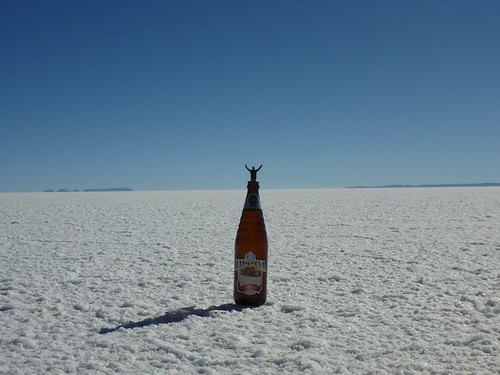
- James squashing Dee into the salt
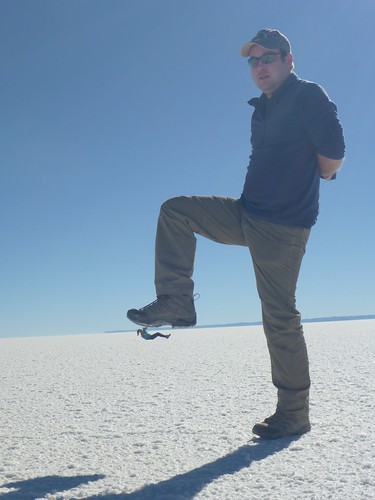
- Holly and Dennis being put inside a beer bottle
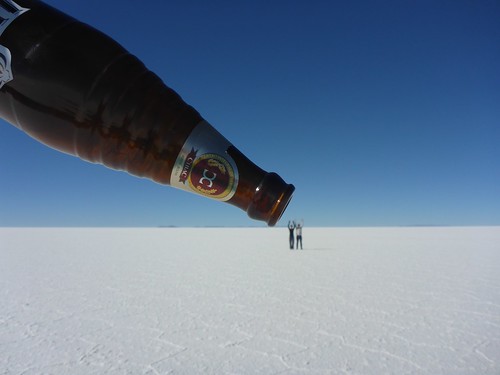
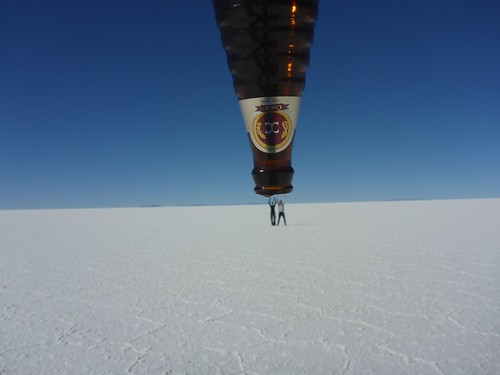
- James running away from a dinosaur
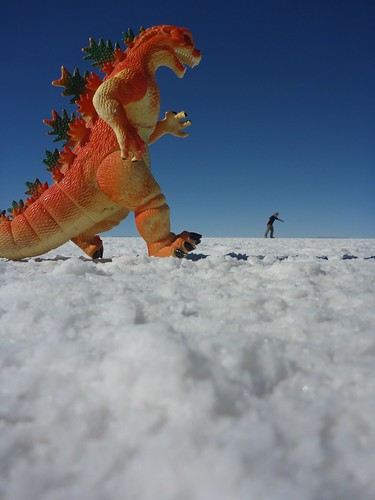
- James walking on Dee’s finger
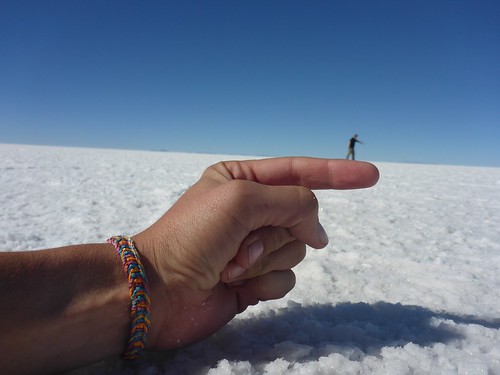
- James, Dennis and Holly running away from a dinosaur (note James’ enthusiasm!)
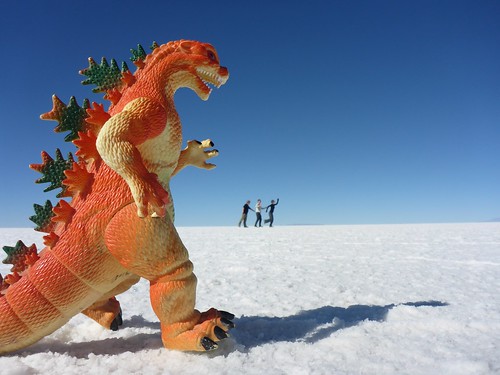
- James, Dennis, Holly, Paul and Danielle running away from a dinosaur
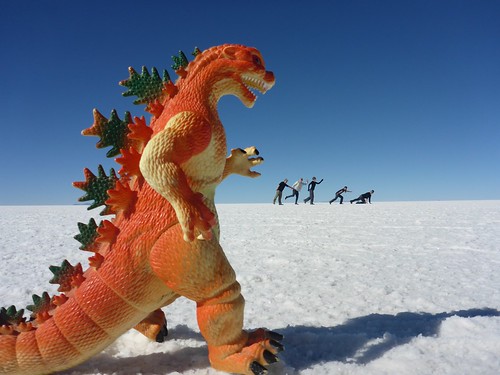
- James, Dennis, Holly, Paul and Danielle standing on Dee’s finger
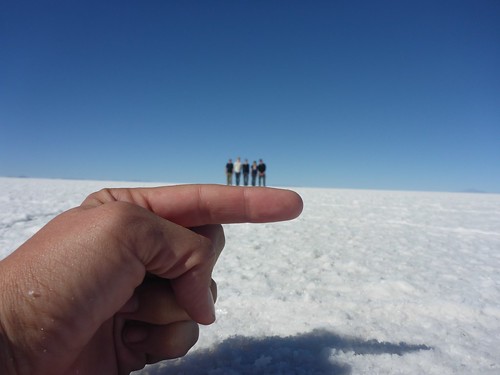
- Holly karate kicking Dennis
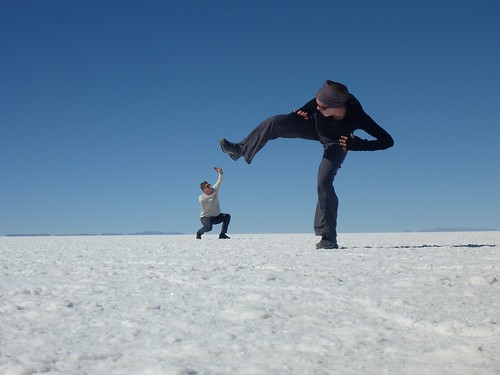
- Dee picking up James by the head
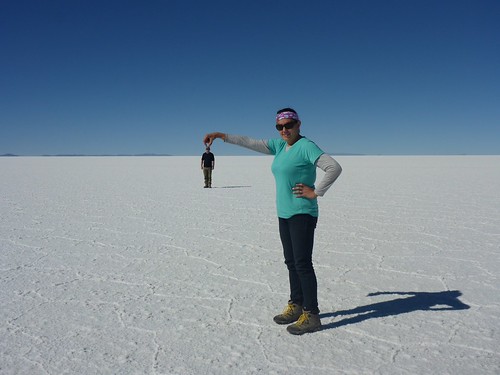
- James standing on Dee’s hand, going in for a kiss
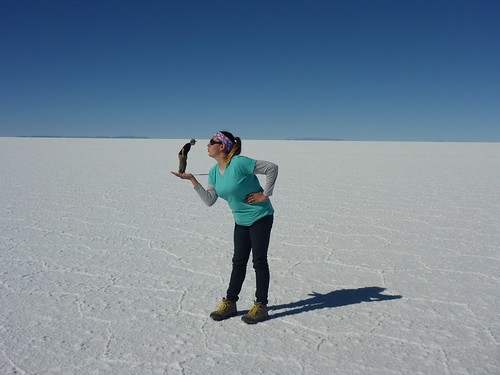
- A Lays can covering James
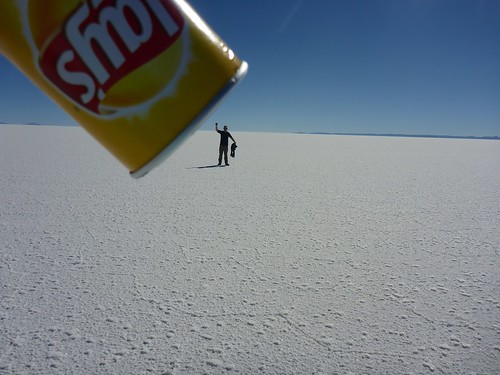
- James eating a giant biscuit
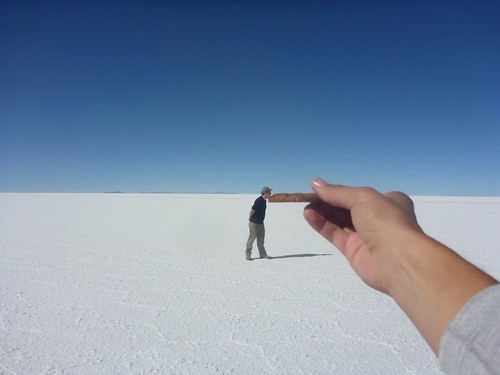
- Dennis wearing giant boots (made of money)
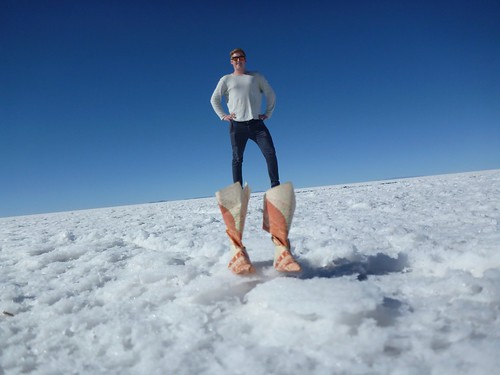
- Dee drinking from a giant beer bottle
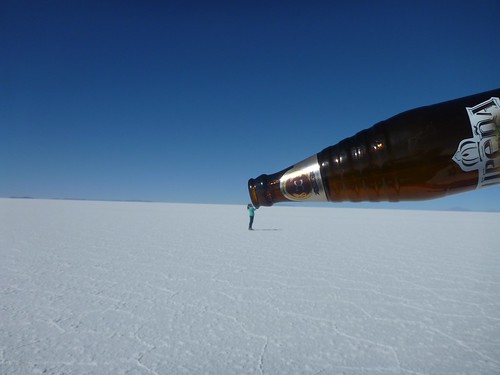
And for the failed photos:
- Holly and Dennis suspended from a lock (bad focus problems)
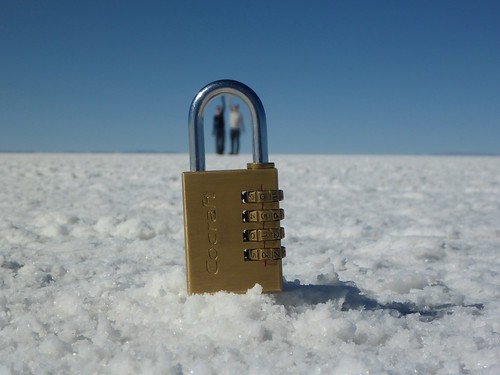
- Dennis, Paul, Danielle, Dee, James and Holly walking out of a Lays can
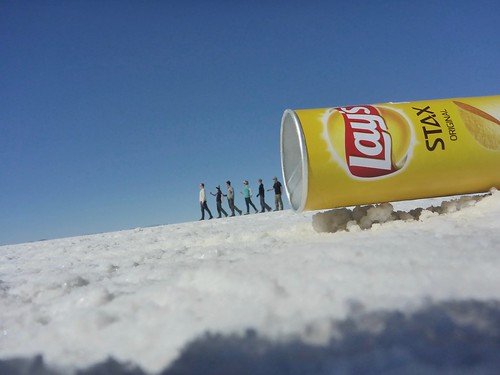
- Dee on James’ hand, going for a kiss
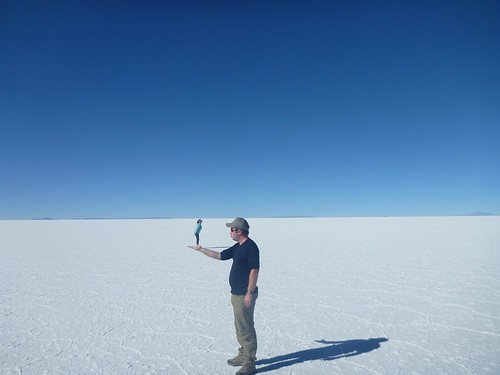
- James drinking from a giant water bottle
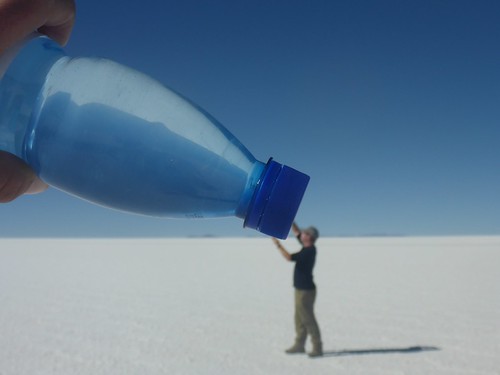
- Dennis standing on Holly’s stomach (taken off to the side)
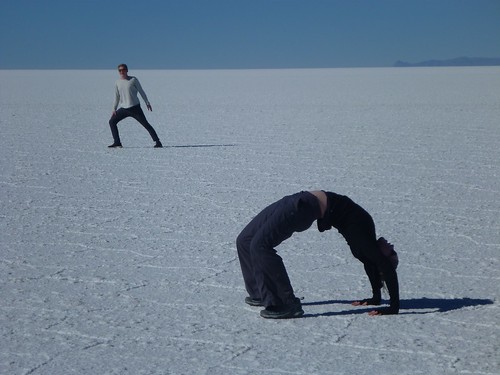
All in all, the salt flats were pretty freaking awesome. But all good things must come to an end, it was time to go back to the car and head to Uyuni. Stopping by a few places on the way; one included llamas made entirely of salt and a salt covered pool in the middle of them.
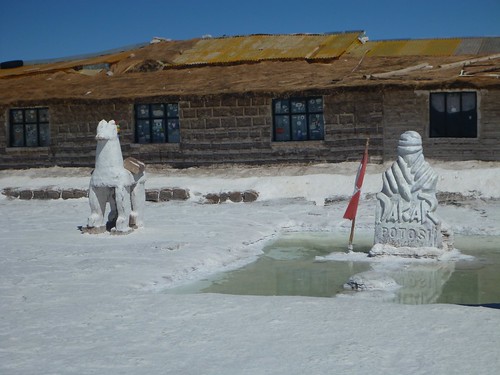
We also came across the Australian flag at a random museum in the middle of the salt flats, as well as a random monument from the Dakar Rally in 2014.
By the time we’d reached one of the small villages with tourist markets we were buggered. The tourist markets are always nice; however the six of us were travelling for more than a month each and buying souvenirs hadn’t really been on the agenda. An hour or so later we arrived into Uyuni and took a walk around the train cemetery, a deserted bit of land with rusted out trains sprawled around it. The trains had mostly been used in mining and are apparently a bit of a tourist attraction; it was really nothing to write home about though.
Arriving in at the Cordillera office we unpacked the truck and were guided into the restaurant next door to the office. Since we had left early to see the sunrise lunch wasn’t supposed to be included. Given two options of meals for lunch, either steak or spaghetti, we realised that both meals weren’t suitable for our vegetarian friends. Dee, with her perfectly formed Spanish, spent five minutes or so trying to explain to the young lady behind the counter (who might have been 8 at the most), that the meat options weren’t suitable. Rattling off every word she knew for meat (bife, pollo, pescado, carne) the young lady was onto it and quickly informed her mum, the kitchen chef, what the go was. Hooray for Spanish!
We finished lunch and headed to our hotel to settle in and have a shower for the first time in three days. Covered in dust, a lot of sunscreen and slightly smelly the shower was a welcome relief. There was no shower curtain in this one but the hot water was fantastic! We settled in for a little relaxing before heading to a pizza place for dinner with the rest of the group. Surprisingly, the little dirt town, with a grand total of 10,000 people had the best pizza of anywhere we’d been in South America thus far. Perfectly cooked thin base, a spattering of delicious topping and not too much cheese was enough to make us smile. Tucking into a couple of beers and reflecting on our experiences from the last few days, it came time for us to say farewell to most of the group.
The rest of our time in Uyuni was non-eventful, we wandered around town and had a look at a few of the statues made from train parts. We did stumble across a fairly random cocktail bar that gave us a bit of a giggle - menu translations have been a little hit and miss in South America. Though here it wasn’t the translations that made the experience funny, the drinks themselves had some pretty hilarious names.
A llama sperm shot:
And then we discovered some of the drinks came with hats…
The following day it was time for us to catch the next of our night buses with the crazy Bolivian drivers. Thankfully when James had booked the bus he made sure he reserved the one that included free heating, although the daytime temperatures in Uyuni and the expected temperature in La Paz didn’t appear to be too ridiculous, the night time temperatures were in the negatives again. Time for the bus, next stop: La Paz.
Go see all the photos from the Atacama crossing and Salar de Uyuni and Uyuni
